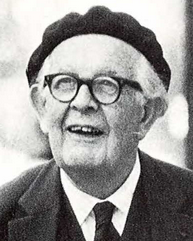Evolutionary linguistics or Darwinian linguistics is a sociobiological approach to the study of language. Evolutionary linguists consider linguistics as a subfield of sociobiology and evolutionary psychology. The approach is also closely linked with evolutionary anthropology, cognitive linguistics and biolinguistics. Studying languages as the products of nature, it is interested in the biological origin and development of language. Evolutionary linguistics is contrasted with humanistic approaches, especially structural linguistics.

Falsifiability is a deductive standard of evaluation of scientific theories and hypotheses, introduced by the philosopher of science Karl Popper in his book The Logic of Scientific Discovery (1934). A theory or hypothesis is falsifiable if it can be logically contradicted by an empirical test.

Sir Karl Raimund Popper was an Austrian–British philosopher, academic and social commentator. One of the 20th century's most influential philosophers of science, Popper is known for his rejection of the classical inductivist views on the scientific method in favour of empirical falsification. According to Popper, a theory in the empirical sciences can never be proven, but it can be falsified, meaning that it can be scrutinised with decisive experiments. Popper was opposed to the classical justificationist account of knowledge, which he replaced with critical rationalism, namely "the first non-justificational philosophy of criticism in the history of philosophy".

Jean William Fritz Piaget was a Swiss psychologist known for his work on child development. Piaget's theory of cognitive development and epistemological view are together called "genetic epistemology".
Critical rationalism is an epistemological philosophy advanced by Karl Popper on the basis that, if a statement cannot be logically deduced, it might nevertheless be possible to logically falsify it. Following Hume, Popper rejected any inductive logic that is ampliative, i.e., any logic that can provide more knowledge than deductive logic. In other words if we cannot assert it logically, we should at the least try to logically falsify it, which led Popper to his falsifiability criterion.
Evolutionary anthropology, the interdisciplinary study of the evolution of human physiology and human behaviour and of the relation between hominids and non-hominid primates, builds on natural science and on social science. Various fields and disciplines of evolutionary anthropology include:
Popper's three worlds is a way of looking at reality, described by the British philosopher Karl Popper in a lecture given in August 1967. The concept involves three interacting worlds, called world 1, world 2 and world 3.

Rupert Riedl was an Austrian zoologist.

Donald Thomas Campbell was an American social scientist. He is noted for his work in methodology. He coined the term evolutionary epistemology and developed a selectionist theory of human creativity. A Review of General Psychology survey, published in 2002, ranked Campbell as the 33rd most cited psychologist of the 20th century.
David Lee Hull was an American philosopher who was most notable for founding the field philosophy of biology. Additionally, Hull is recognized within evolutionary culture studies as contributing heavily in early discussions of the conceptualization of memetics. In addition to his academic prominence, he was well known as a gay man who fought for the rights of other gay and lesbian philosophers. Hull was partnered with Richard "Dick" Wellman, a Chicago school teacher, until Wellman's passing during the drafting of Science as Process.
Cultural selection theory is the study of cultural change modelled on theories of evolutionary biology. Cultural selection theory has so far never been a separate discipline. However it has been proposed that human culture exhibits key Darwinian evolutionary properties, and "the structure of a science of cultural evolution should share fundamental features with the structure of the science of biological evolution". In addition to Darwin's work the term historically covers a diverse range of theories from both the sciences and the humanities including those of Lamark, politics and economics e.g. Bagehot, anthropology e.g. Edward B. Tylor, literature e.g. Ferdinand Brunetière, evolutionary ethics e.g. Leslie Stephen, sociology e.g. Albert Keller, anthropology e.g. Bronislaw Malinowski, Biosciences e.g. Alex Mesoudi, geography e.g. Richard Ormrod, sociobiology and biodiversity e.g. E.O. Wilson, computer programming e.g. Richard Brodie, and other fields e.g. Neoevolutionism, and Evolutionary archaeology.
Evolutionary educational psychology is the study of the relation between inherent folk knowledge and abilities and accompanying inferential and attributional biases as these influence academic learning in evolutionarily novel cultural contexts, such as schools and the industrial workplace. The fundamental premises and principles of this discipline are presented below.
In Karl Popper's philosophy, the main problem of methodology and philosophy of science is to explain and promote the growth of knowledge. To this purpose, Popper advocated his theory of falsifiability, testability and testing. He wrote in The Logic of Scientific Discovery: "The central problem of epistemology has always been and still is the problem of the growth of knowledge. And the growth of knowledge can be studied best by studying the growth of scientific knowledge."
Darwinian literary studies is a branch of literary criticism that studies literature in the context of evolution by means of natural selection, including gene-culture coevolution. It represents an emerging trend of neo-Darwinian thought in intellectual disciplines beyond those traditionally considered as evolutionary biology: evolutionary psychology, evolutionary anthropology, behavioral ecology, evolutionary developmental psychology, cognitive psychology, affective neuroscience, behavioural genetics, evolutionary epistemology, and other such disciplines.
The following outline is provided as a topical overview of science; the discipline of science is defined as both the systematic effort of acquiring knowledge through observation, experimentation and reasoning, and the body of knowledge thus acquired, the word "science" derives from the Latin word scientia meaning knowledge. A practitioner of science is called a "scientist". Modern science respects objective logical reasoning, and follows a set of core procedures or rules to determine the nature and underlying natural laws of all things, with a scope encompassing the entire universe. These procedures, or rules, are known as the scientific method.
Epistemology or theory of knowledge is the branch of philosophy concerned with the nature and scope (limitations) of knowledge. It addresses the questions "What is knowledge?", "How is knowledge acquired?", "What do people know?", "How do we know what we know?", and "Why do we know what we know?". Much of the debate in this field has focused on analyzing the nature of knowledge and how it relates to similar notions such as truth, belief, and justification. It also deals with the means of production of knowledge, as well as skepticism about different knowledge claims.
In psychology, constructivism refers to many schools of thought that, though extraordinarily different in their techniques, are all connected by a common critique of previous standard approaches, and by shared assumptions about the active constructive nature of human knowledge. In particular, the critique is aimed at the "associationist" postulate of empiricism, "by which the mind is conceived as a passive system that gathers its contents from its environment and, through the act of knowing, produces a copy of the order of reality".
Genetic epistemology or 'developmental theory of knowledge' is a study of the origins (genesis) of knowledge (epistemology) established by Swiss psychologist Jean Piaget. This theory opposes traditional epistemology and unites constructivism and structuralism. Piaget took epistemology as the starting point and adopted the method of genetics, arguing that all knowledge of the child is generated through interaction with the environment.
Universal Darwinism, also known as generalized Darwinism, universal selection theory, or Darwinian metaphysics, is a variety of approaches that extend the theory of Darwinism beyond its original domain of biological evolution on Earth. Universal Darwinism aims to formulate a generalized version of the mechanisms of variation, selection and heredity proposed by Charles Darwin, so that they can apply to explain evolution in a wide variety of other domains, including psychology, linguistics, economics, culture, medicine, computer science, and physics.
Cultural evolution is an evolutionary theory of social change. It follows from the definition of culture as "information capable of affecting individuals' behavior that they acquire from other members of their species through teaching, imitation and other forms of social transmission". Cultural evolution is the change of this information over time.






